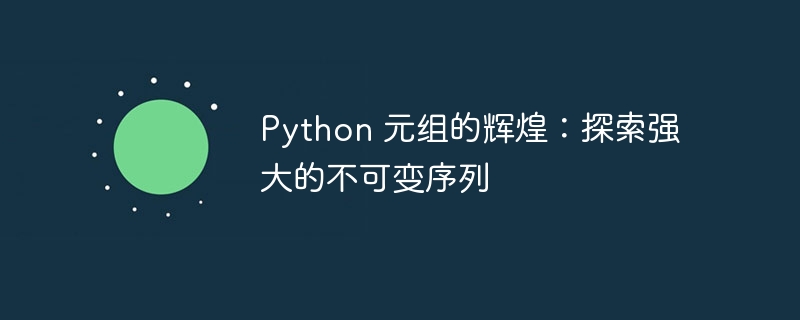

Advantages of Immutability:
The immutability of tuples makes them ideal for storing immutable data, such as enumeration types, constants, and intermediate results. This feature ensures the security and consistency of the data and prevents accidental modification or damage.
Creating and manipulating tuples:
Tuples can be created using parentheses (), with elements separated by commas. Unlike a list, the elements of a tuple are not modifiable, either through index assignment or using the append and remove methods.
Efficiency of tuple operations:
Due to its immutability, tuple operations have excellent efficiency. Since the contents of a tuple never change after creation, python can optimize access to and manipulation of tuples. This makes tuples the first choice when fast and reliable access is required.
Common use cases for tuples:
Tuples are widely used in Python Programming, including:
Comparison of tuples and lists:
Tuples and lists are both ordered sequences, but they have fundamental differences in their immutability and modification capabilities. A list is mutable and allows modification of its elements, whereas a tuple is immutable and does not allow modification. Tuples are a better choice for scenarios where you need to protect data integrity or perform fast operations.
Special methods of tuples:
Tuples provide a series of special methods, making them a versatile data structure :
len(): Returns the number of elements in the tuplemin() and max(): Return the minimum and maximum values in the tuplesum(): Returns the sum of all elements in the tupleindex(): Returns the index of the specified element in the tuplecount(): Returns the number of times the specified element appears in the tupleNamed tuple:
Python 3.6 introduced named tuples, allowing names to be assigned to elements in the tuple. This improves readability and maintainability, especially when using tuples with objects or records with different properties.
in conclusion:
Python tuples are powerful immutable sequences that play a crucial role in storing immutable data, maintaining data integrity, and performing fast operations. Its immutability ensures data security and consistency, making it ideal for scenarios that require reliable and efficient data structures.
The above is the detailed content of The Glory of Python Tuples: Exploring Powerful Immutable Sequences. For more information, please follow other related articles on the PHP Chinese website!




